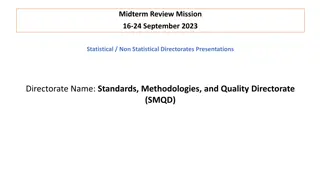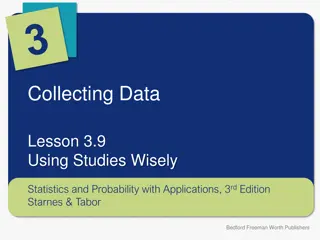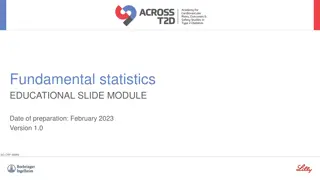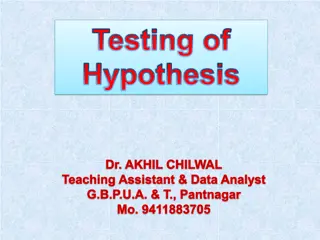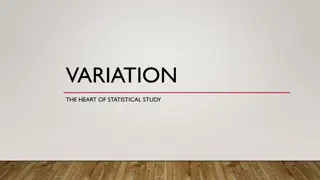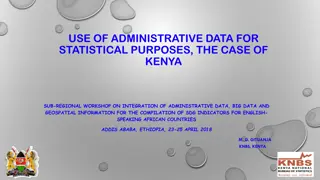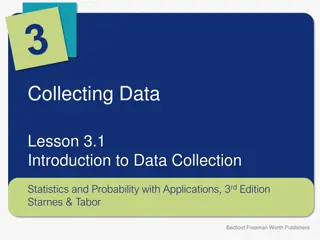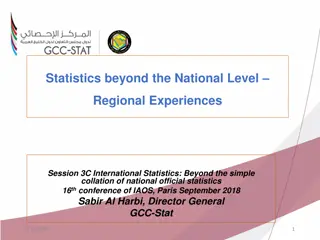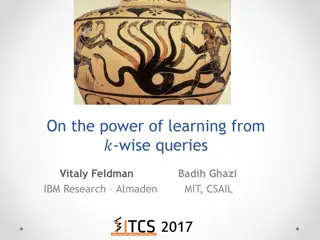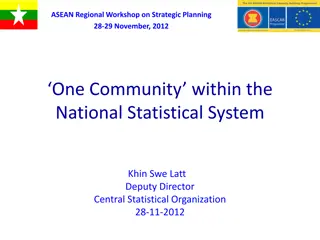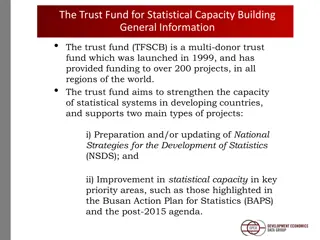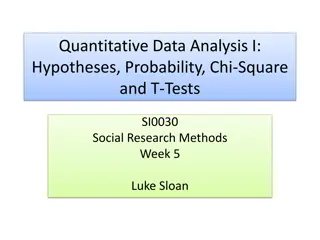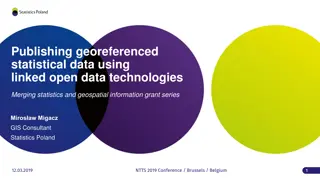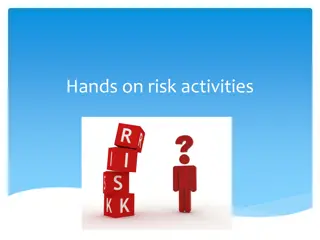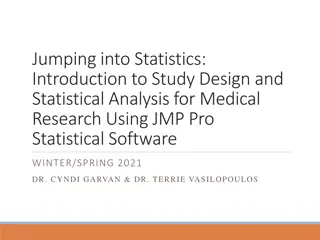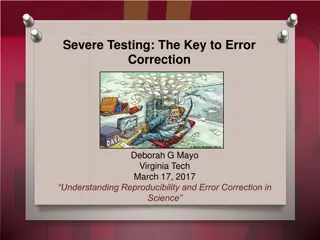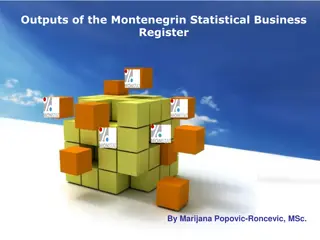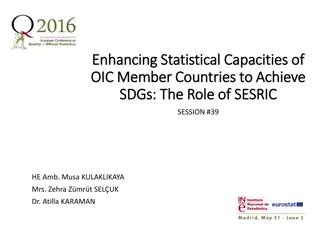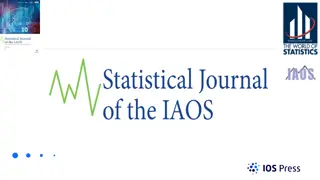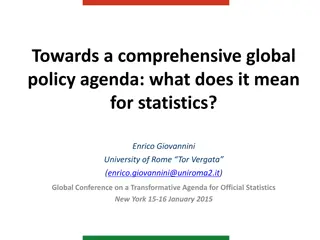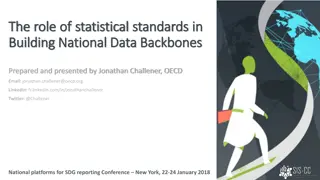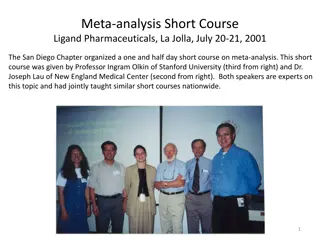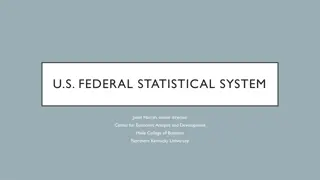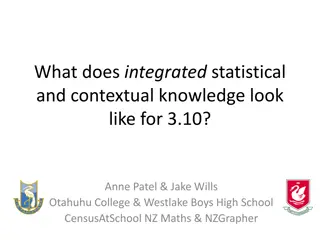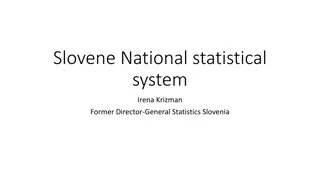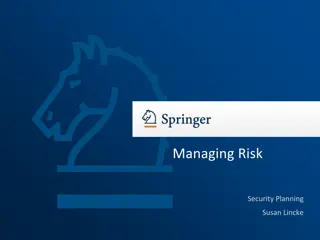Understanding Risk Management in Environmental Geography and Disaster Management
Risk management in environmental geography and disaster management involves assessing the potential losses from hazards, evaluating vulnerability and exposure, and implementing strategies to mitigate risks. It includes calculating risk, dealing with risk through acceptance, avoidance, reduction, or
1 views • 10 slides
Standards, Methodologies, and Quality in Statistical Programs and Services
This presentation highlights the role of the Standards, Methodologies, and Quality Directorate in overseeing statistical programs and services. It covers topics such as quality assurance, sampling frames, statistical classifications, and user satisfaction surveys. The directorate collaborates with v
1 views • 13 slides
Biostatistician Expert Offering Statistical Support and Training at CAMH
Marcos Sanches is a biostatistician at Biostatistic Core, CAMH, dedicated to enhancing the statistical quality of research projects. With expertise in various study designs, statistical techniques, and software, Marcos provides support throughout the project lifecycle, from grant applications to dat
5 views • 7 slides
Understanding the Scope of Inference in Statistical Studies
Statistical studies require careful consideration of the scope of inference to draw valid conclusions. Researchers need to determine if the study design allows generalization to the population or establishes cause and effect relationships. For example, a study on the effects of cartoons on children'
0 views • 15 slides
Understanding Statistical Methods for Clinical Endpoints in Diabetes Research
This educational slide module delves into fundamental statistics for analyzing clinical endpoints in diabetes research. It covers the choice of statistical methods, the distinction between statistical and clinical significance, and the importance of different endpoints in evaluating clinical benefit
1 views • 37 slides
Project Risk Management Fundamentals: A Comprehensive Overview
Project risk management involves minimizing potential risks and maximizing opportunities through processes such as risk management planning, risk identification, qualitative and quantitative risk analysis, risk response planning, and risk monitoring and control. Quantitative risk analysis assesses t
0 views • 41 slides
Understanding Hypothesis Testing in Statistical Analysis
Statistical analysis aims to make inferences about populations based on sample data. Hypothesis testing is a crucial aspect where decisions are made regarding accepting or rejecting specific values or parameters. Statistical and parametric hypotheses, null hypotheses, and decision problems are key c
1 views • 34 slides
Statistics for Managers: A Comprehensive Course Overview
This course aims to equip managers with statistical skills to analyze data effectively and make informed decisions in various management areas. It covers topics such as measures of central tendency, statistical models, and the importance of statistical analysis in improving business decisions. The i
1 views • 15 slides
Understanding Degrees of Freedom in Statistical Models
Exploring the concept of degrees of freedom in statistical modeling, this presentation discusses the importance of having adequate degrees of freedom for model fitting and interpretation. It compares different models with varying degrees of freedom, illustrating how a null model with zero parameters
0 views • 27 slides
Understanding Variation in Statistical Studies
Variability is key in statistical studies, shaping the essence of statistical analysis. Students often struggle to grasp the concept of variability, despite being taught statistical methods. The term "variation" takes on different meanings in various statistical contexts, presenting challenges in co
1 views • 54 slides
Utilizing Administrative Data for Statistical Analysis in Kenya's National Statistical System
Kenya National Bureau of Statistics (KNBS) employs administrative data for statistical purposes, as highlighted in the sub-regional workshop on integrating administrative data, big data, and geospatial information for compiling SDG indicators. The legal and institutional framework, data collection m
0 views • 21 slides
Introduction to Data Collection & Statistics: Understanding Statistical Questions, Population, and Sampling
This material introduces the fundamental concepts of data collection and statistics. Learning objectives include distinguishing statistical questions, identifying populations and samples, and understanding the difference between observational studies and experiments. It discusses the process of stat
0 views • 14 slides
Enhancing Regional Integration Through Statistical Collaboration in the GCC
Regional statistics play a crucial role in informing regional policies, monitoring progress, and assessing developmental outcomes. The Gulf Cooperation Council (GCC) has established GCC-Stat as a regional statistics center to meet statistical requirements at the GCC level. By improving regional data
7 views • 8 slides
Exploring the Power of Wise Queries in Statistical Learning
Dive into the world of statistical learning with a focus on the impact of wise queries. Discover how statistical problems are approached, the significance of statistical queries, and the comparisons between wise and unary queries. Explore the implications for PAC learning and uncover key insights in
0 views • 8 slides
Understanding IBM SPSS for Statistical Analysis
IBM SPSS, formerly known as Statistical Package for the Social Sciences, is a powerful software package for statistical analysis used by researchers across various industries. Developed in the late 1960s, SPSS offers features for data management, statistical analysis, and data documentation. It simp
1 views • 13 slides
Overview of Myanmar Statistical System and Central Statistical Organization
The Myanmar Statistical System operates as a decentralized system with the Central Statistical Organization playing a crucial role at the national level. Various surveys and data collection efforts are undertaken by different ministries and agencies, coordinated by the CSO. The CSO compiles and pres
0 views • 18 slides
The Trust Fund for Statistical Capacity Building
The Trust Fund for Statistical Capacity Building (TFSCB) is a multi-donor trust fund launched in 1999, supporting over 200 projects worldwide to strengthen statistical systems in developing countries. It focuses on national strategy development and improving statistical capacity in key priority area
1 views • 5 slides
Understanding Hypotheses, Probability, and Statistical Tests in Social Research
This content delves into formulating hypotheses in social science, selecting statistical tests based on variables' measurement levels, understanding probability in statistical analysis, and distinguishing between null and alternative hypotheses. It emphasizes the research process involving hypothesi
5 views • 21 slides
Development of Guidelines for Publishing Georeferenced Statistical Data Using Linked Open Data Technologies
Development of guidelines for publishing statistical data as linked open data, merging statistics and geospatial information, with a primary focus on preparing a background for LOD implementation in official statistics. The project aims to identify data sources, harmonize statistical units, transfor
1 views • 31 slides
Understanding Risk: Definitions and Concepts Explored
Delve into the world of risk with definitions ranging from baseline and absolute risk to relative risk, providing insights into how we perceive and manage uncertainties in various aspects of life. Explore the nuances of risk through engaging activities and gain a deeper understanding of statistical
0 views • 22 slides
Jumping into Statistics: Study Design & Statistical Analysis in Medical Research
Explore the fundamentals of study design & research methodology, learn to select appropriate statistical tests, and practice statistical analysis using JMP Pro Software. Topics include research question formulation, statistical methods, regression, survival analysis, data visualization, and more. Un
0 views • 31 slides
Understanding Error Correction and Reproducibility in Science
Explore the importance of severe testing, statistical crisis of replication, and the American Statistical Association's stance on P-values in ensuring reproducibility and error correction in scientific research. Delve into the philosophical, statistical, and historical aspects of error statistical m
0 views • 63 slides
Understanding the Montenegrin Statistical Business Register
The Montenegrin Statistical Business Register plays a crucial role in producing economic statistics by serving as a directory for legal and statistical units. This live register undergoes continuous changes, with administrative and statistical sections ensuring consistency. The register updates data
0 views • 16 slides
Enhancing Statistical Capacities of OIC Member Countries to Achieve SDGs: The Role of SESRIC
This presentation discusses the importance of enhancing statistical capacities in OIC member countries to achieve Sustainable Development Goals (SDGs), with a focus on the role of SESRIC. It covers the evolution of statistical definitions, the use of Statistical Capacity Index (SCI) for analysis, an
2 views • 17 slides
Statistical Journal of IAOS: Insights and Trends
Statistical Journal of the IAOS (SJIAOS) serves as the central platform for advancing official statistics globally. In 2023, it featured 78 articles in four regular issues, emphasizing strategic themes, methodological advancements, and the importance of open access. While experiencing a decline in a
0 views • 15 slides
Enhancing Global Statistical Systems for Sustainable Development
The post-2015 development agenda emphasizes the need for a comprehensive global policy agenda, impacting statistical systems worldwide. This agenda seeks to improve data collection, coordinate international statistical efforts, and enhance national statistical systems by 2020 to support the Sustaina
0 views • 23 slides
Understanding Risk Concepts and Management Strategies in Finance
Explore the essential concepts of risk in finance, such as risk definition, risk profiles, financial exposure, and types of financial risks. Learn about risk vs. reward trade-offs, identifying risk profiles, and tools to control financial risk. Understand the balance between risk and return, and the
0 views • 18 slides
Risk and Return Assessment in Financial Management
This comprehensive presentation explores the intricacies of risk and return assessment in the realm of financial management. Delve into understanding risk concepts, measuring risk and return, major risk categories, and the impact of risk aversion on investment decisions. Gain insights into the manag
0 views • 62 slides
Risk Management & MPTF Portfolio Analysis at Programme Level for UN Somalia
This session delves into the world of risk management and portfolio analysis at the programme/project level, specifically focusing on the Risk Management Unit of the United Nations Somalia. It covers enterprise risk management standards, planned risk management actions, the role of RMU, joint risk m
0 views • 30 slides
Statistical Genomics Lecture 5: Linear Algebra Homework Questions
Explore the concepts of random variables, covariance matrix, special matrices, and self-defined functions in statistical genomics through a series of homework questions. Gain insights into linear algebra and statistical genomics while working on Homework 1, analyzing the expectation and variance of
0 views • 22 slides
Role of Statistical Standards in Building National Data Backbones
The role of statistical standards in constructing national data backbones is crucial for efficient data dissemination and reporting, especially in the context of Sustainable Development Goals (SDGs). Statistical standards guide the orchestration of information flows within a national statistical net
0 views • 22 slides
Statistical Events in San Diego Area (2001-2003)
Several significant statistical events took place in the San Diego area between 2001 and 2003, featuring renowned speakers and experts in the field. These events covered topics such as meta-analysis, global atmospheric changes, statistical trends, and annual statistical career days. The gatherings p
0 views • 12 slides
Overview of the U.S. Federal Statistical System and Census Geography
The U.S. Federal Statistical System comprises 13 principal statistical agencies responsible for collecting and analyzing data across various sectors. The system includes agencies like the Bureau of Economic Analysis, Bureau of Labor Statistics, and U.S. Census Bureau. Geographic identifiers (GEOIDs
0 views • 94 slides
Enhancing Statistical Inference in Educational Investigations
This content delves into the importance of integrated statistical and contextual knowledge for achieving success in Level 3 NCEA statistics involving the statistical enquiry cycle. It emphasizes the essential steps of posing investigative questions, utilizing appropriate statistical methods, discuss
0 views • 26 slides
Risk Analysis in Environmental Management: A Comprehensive Overview
Risk analysis plays a crucial role in environmental management, particularly in assessing potential health hazards and managing associated risks. This process involves risk assessment and risk management, with steps such as hazard identification, exposure assessment, dose-response assessment, and ri
0 views • 27 slides
Slovene National Statistical System Overview
The Slovene National Statistical System comprises institutions like the Statistical Office of the Republic of Slovenia and various advisory committees responsible for producing official statistical data following European and UN standards. It emphasizes neutrality, objectivity, transparency, and con
0 views • 9 slides
Statistically Significant Shortcuts in Statistics: Simplifying Complex Concepts
In this informative presentation by Milo Schield, shortcut formulas for statistical significance are explored to make understanding of key statistical ideas more manageable. Various shortcuts for proportions, Chi-squared tests, correlations, relative risk, and t-tests are discussed, aiming to enhanc
0 views • 8 slides
Developing a Risk Appetite Culture: Importance and Framework
Risk management plays a critical role in the success of corporations, with strategy and risk being intertwined. This presentation delves into definitions of key terms such as risk appetite, the Risk Appetite Cycle, characteristics of a well-defined risk appetite, and the importance of expressing ris
0 views • 31 slides
Security Planning and Risk Management Overview
This content provides an in-depth exploration of managing risk, security planning, and risk appetite in the context of cybersecurity. It covers essential concepts such as risk management process, threat types, risk analysis strategies, vulnerability assessment, and risk mitigation techniques. The ma
0 views • 73 slides
Statistical Tools for Method Validation in USP General Chapter 1210
In the USP General Chapter 1210, Statistical Tools for Method Validation are outlined, serving as a companion to the validation of Compendial Procedures. The chapter covers important topics like Accuracy, Precision, Linearity, LOD, LOQ, and range. It emphasizes statistical tools such as TOST, statis
0 views • 22 slides

